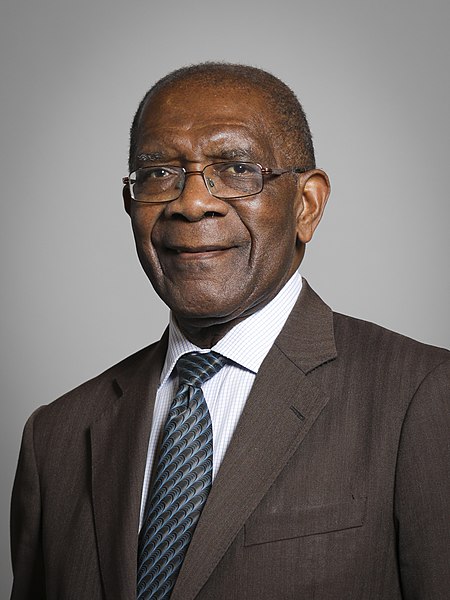William Manuel Morris, Baron Morris of Handsworth, OJ, DL, widely known as Bill Morris. Is the first black leader of a major British trade union.

Morris was born in Bombay Jamaica in 1938 and lived with his parents. His mother was a domestic science teacher and his father a part-time policeman. His mother emigrated to Handsworth, Birmingham to find work following his father’s death. Morris joined her in 1954, finding work at a local car parts manufacturer, Hardy Spicer Engineering Ltd whilst attending day-release courses in engineering skills at Handsworth Technical College.
Bill’s trade union life began in 1958 when he joined the Transport and General Workers Union. He was elected a shop steward at Hardy Spicers in 1963 and the following year he was involved in his first major industrial dispute, over the issue of trade union recognition. He held a wide range of elected positions within the Transport and general, including membership of its governing body and the General Executive Council. Morris also took advantage of the T&G’s considerable education programme, learning about trade unions, labour history and industrial law and health and safety.
In 1991, Bill was elected General Secretary of the T&G by a postal ballot of members. The result made Morris the first black general secretary of a trade union and arguably one of the most influential black people in Britain at that time. But he made it clear he did not wish to be known or judged as a black General Secretary: as he said at the time of his election, “I am not the black candidate, rather the candidate who is black.”
In 1995 he was re-elected to the post of General Secretary and he remained in the post until his retirement on his 65th birthday, 19 October 2003.
Although Morris retired as General Secretary on 11 April 2006, it was announced that he would take a seat in the House of Lords as a working life peer under the Labour Party whip. Bill was named as Baron Morris of Handsworth, of Handsworth in the County of West Midlands in June of that same year.
Prior to this Morris had already been awarded the Order of Jamaica in 2002 and received a knighthood in the 2003 Queen’s Birthday Honours. Talking about receiving the award he said “I hope that in this recognition, today’s young black Britons will find some inspiration. I have always held the view that race can be an inspiration, not a barrier.”
Throughout his career Bill served on a wide range of national bodies including the Advisory Councils of the British Broadcasting Corporation (BBC) and Independent Broadcasting Authority (IBA), and was appointed to the Economic and Social Affairs Committee of the European Union. For a number of years he was a member of the Labour Party’s Conference Arrangements Committee and for ten years he was a member of the Commission for Racial Equality.
Retired from both T&G and the house of lords Bill Morris is still continuing his work and is currently a member of the Employment Appeals Tribunal, the TUC General Council, the advisory committee of The Prince’s Youth Business Trust, the Trustee Board of the Open University Foundation, the Governing Council of Atlantic College, the Courts of Nene College and Luton University, and the Board of Governors of South Bank University.
His most recent appointment is as a non-executive Director of the Bank of England. He is a Fellow of the RSA and the City and Guilds of London Institute and he holds honorary degrees from a number of British universities.
